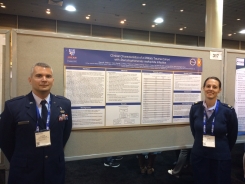ABOUT
The Infectious Disease Clinical Research Program (IDCRP) was founded in 2005 to create a Department of War (DoW) resource for risk assessment and solutions regarding problems the military faces in the world of infectious diseases. Created under an interagency agreement between the Uniformed Services University of the Health Sciences (USU), Department of Preventive Medicine and Biostatistics, and the National Institute of Allergy and Infectious Diseases (NIAID) and through a cooperative agreement with The Henry M. Jackson Foundation for the Advancement of Military Medicine, Inc. (HJF), the Program’s work is executed through a unique, adaptive and collaborative, international clinical research network. This one-of-a-kind network directly affects force readiness and positions IDCRP on the cutting edge of advancing clinical practice and informing health policy for military personnel.
In collaboration with partners from the DoW, academia, government, and industry, IDCRP supports a broad clinical research portfolio within the Military Health System. From observational, longitudinal cohort studies to field-based interventional trials to the evaluation of long-term health outcomes, IDCRP conducts protocols that address critical knowledge gaps in the control and prevention of infectious diseases in the military. Study outcomes have far-reaching implications for public health and disease prevention beyond military communities.
The Staff
More than 80 research and program-support personnel are employed by IDCRP. These exceptional individuals meet the challenge of supporting the diverse IDCRP portfolio, which includes clinical research spanning retrospective observational studies to prospective clinical trials.
More than half of our personnel directly interact with research study subjects at clinical sites within the military hospital/clinic network. Clinical research coordinators comprise the majority of these professionals. Additional members of the IDCRP staff include clinical investigators based at military clinical sites and USU and protocol-support personnel, such as clinical research and site managers, program and data managers, laboratory staff, and biostatisticians.
The expertise of IDCRP staff members includes infectious diseases, epidemiology, preventive medicine, public health, microbiology, data programming, statistical analysis, finance, program management, and regulatory affairs. Staff members are distributed within DoW medical treatment facilities, USU, and operational clinics within the United States, as well as at overseas locations. More than half of IDCRP personnel have earned at least two degrees and everyone within the team adds to the wealth of knowledge and experience that has led to the success of the IDCRP.
Vision
To eliminate the impact of infectious diseases in the military population through collaborative clinical research.
For more information, please see the IDCRP brochure.
Mission
“To conduct multicenter infectious disease clinical research, focusing on high-impact cohort and interventional trials, to inform and improve care of the WarfighteR”
Education & Mentorship
Through our long-standing commitment to developing the next generation of infectious disease clinical researchers in the US Armed Forces, we provide mentored research opportunities to medical and public health students, medical residents, infectious disease fellows, and graduate students. The Program also supports the clinical research capstone curriculum for USU medical students, as well as continuing Graduate Medical Education activities at Walter Reed National Military Medical Center.
